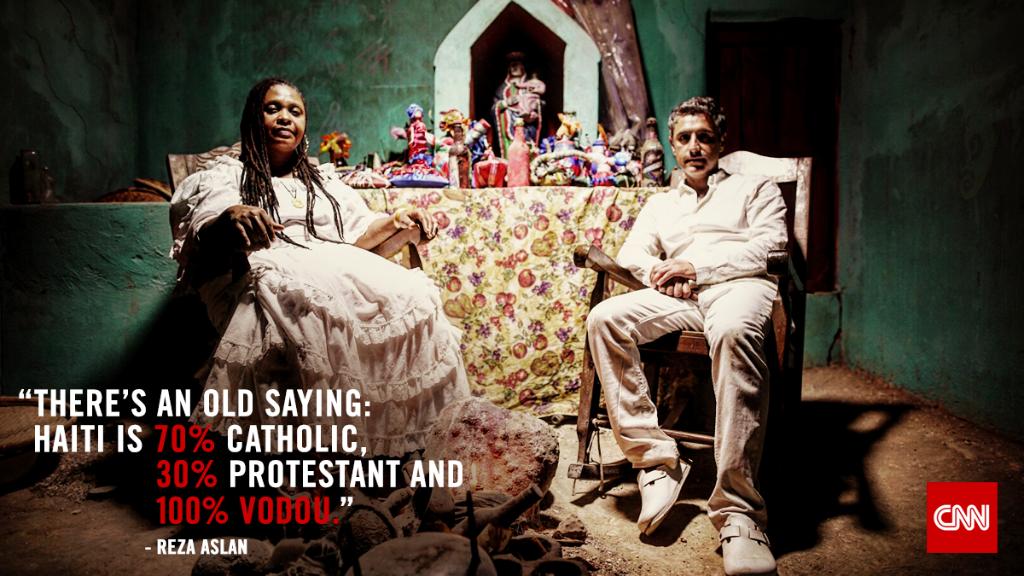
Written by Guest Blogger Celucien L. Joseph, PhD
In his spiritual adventure series, sponsored by CNN, religious scholar Reza Aslan undertakes a series of ethnographic research based on his visits in various countries and interviews with religious adherents and religious leaders of different religious traditions. In his visit to Haiti, he visited some of the most sacred spaces of the Vodou religion such as the sacred waterfall Saut-d’Eau, a popular site for Vodou pilgrimage. In Haiti, he interviewed Evangelical leaders of Protestant Christianity and Hougan and mambo of the Vodou religion to gain various perspectives of Haiti’s popular religion.
Aslan’s underlying objective is to shed better understanding of the Vodou religion that has often been misrepresented as evil, paganism, cannibalism, sorcery, witchcraft, etc. in the writings of American and European missionaries and writers. Aslan is also interested in challenging those distortions of Vodou and resituate Vodou in its rightful place as a legitimate religion like any other religions of the world. In the conclusion of his documentary on Vodou, Professor Reza Aslan seems to rearticulate a commonly-held misconception about Haiti, a nation, and Vodou, a religious system, when he declares “Vodou is Haiti. Haiti is Vodou.”
It is like saying Christianity is America. America is Christianity. This is a false dichotomy that does not represent the religious and experience and diversity of the Haitian people. Haiti is not a religion. Haiti is a country. Vodou is not a country, but a religion among other religious traditions practiced in Haiti. In fact, the ancestral faith of the Haitian people is not monolithic. It is African traditional religion (i.e. Vodoun), Christianity, and Islam. In the remaining part of this short analysis, I would like to communicate a few ideas about three important issues that are intertwined and closely related to each other: religion, religious affiliation, and the construction of self and collective national identity based on certain religious tradition or system. The emphasis of this brief reflection will be on Haitian Vodou and Haitian (national) identity.
Here are my 13 propositions:
- Religious experience could be both personal and collective.
- Religious piety is not spirituality.
- Religious affiliation is a choice–at least in most Western societies and nation-states. (I understand it may not be a personal choice in certain countries where religious freedom is limited or not prized!) It is also observed that some countries in the Middle East, for example, have adopted a state religion such as Islam.
- While a person may be born into a particular religious tradition or system–such as Haitian Vodou, Christianity, Judaism, Taoism, Hinduism, Buddhism, Islam, etc.–genuine religious affiliation, however, should be a personal choice of the individual.
As we say in Kreyol, “Yo pa achte Lwa” (“One cannot buy a Lwa/Spirit) (Nonetheless, I do understand that Vodou is also a family religion, and the religious heritage can be passed on from one generation to the next. However, that in itself does not qualify a family member to automatically become a Vodouizan, a Hougan or Mambo. Allow me to share a personal example: my grandmother from my mother’s side was a mambo (Vodou priestess), and my grandfather from my mother’s side served many lwa, even married to several of them (Spiritual marriage in Vodou). Nonetheless, my mother never practiced Vodou nor has she inherited the tradition or passed it on to her children. My father’s parents (my grandparents) were not Vodou practitioners). From this vantage point, religious affiliation is certainly not an entitlement.
- Hence, to be born into a Haitian family does not automatically make one a Vodouizan or Vodouist.
- Haiti is a country. Haitian is a national identity. Vodouizan is a religious affiliation. These three things are not the same and certainly not synonymous or interchangeable.
- Haitians, both in Haiti and the Haitian Diaspora, have embraced various and competing religious affiliations. Haitians are Muslims, Buddhists, Christians, Catholic practitioners, Protestants, Agnostics, Atheists, Secular humanists, Jehovah Witnesses, Mormons, etc. As a result, Haitians are free to embrace any religious worldview or system.
- Vodou is one among other religions practiced by Haitians both in Haiti and the Diaspora. Our ancestral faith is not monolithic; it is rather pluralistic. (In fact, Vodou itself is not a homogeneous religion.) Our African ancestors who were brought by force to the island of Saint Domingue brought with them various traditions, practices, customs, and competing religious practices and worldviews including Christianity, African Traditional religions, Islam, etc. While living on the island, they also adopted the religions of the Native Americans, and incorporated them into the religion of Vodou; they have also integrated Christian rituals and theology, and Masonic humanist morality and rituals into Vodou. While a large number of the enslaved population practiced what is now labelled as Haitian Vodou, not all of them were Vodou practitioners.
- To embrace another religion other than Vodou should not be construed as the devalorization of the Haitian culture—since religions and cultures are human inventions and part of the process and theory we call social constructionism. In a true democratic state, the individual is granted the right of religious freedom and preference.
The ideology in contemporary Haitian scholarship is that to be Haitian is to be a Vodouizan. Many Haitianist scholars have “essentialized Vodou” as the religion of all Haitians, just like certain individuals have “essentialized” race and culture. This tendency among scholars, both in the Anglophone and Francophone worlds, does not do justice to the reality and the lived-experiences of the Haitian people–both in Haiti and the Haitian Diaspora. I would suggest that Vodou, Christianity, and Islam had played a pivotal role in the Haitian Revolution since Vodou itself is a syncretized faith which integrates Christian moral theology and ritual into its own brand of practice.
Secondly, Francois Makandal, Dutty Boukman, and other important maroon leaders, and revolutionary leaders embraced Islam; they were also Vodouizan.
Thirdly, the founding fathers Toussaint Louverture and Alexandre Petion were devout Roman Catholic by confession. In 1816, President Petion had invited Protestant Christianity in Haiti–what is now called today “Evangelical Christianity—only 12 yrs after the founding of the new nation of Haiti ( I do understand there is a great divide between Evangelical Christianity of the 19th century and that of the 21st century, as to their political affiliation and theological confessions).
Fourthly, a large number of the enslaved Africans practiced Vodou as a religion; on the other hand, the enslaved Congolese who were brought to Saint-Domingue at the end of the 18th century were equally Catholic Christians as Catholicism became the state religion of Congo in early 15th century– even before Christopher Columbus visited the Americas. A large number of the enslaved Senegalese who were brought to the island were Muslims–an important point Jean Price-Mars affirms in Chapter 3 (L’Afrique, ses races et sa civilization”) in “Ainsi parla l’Oncle.”
In summary, in Haiti’s contemporary society, there are three major religious practices: Vodou, Protestant/Evangelical Christianity, Vodou, Roman Catholicism. (Islam is growing rapidly in Protestant Christianity is practiced by 45% of the Haitian population. It is probably more in 2016–giving the wide spread of Evangelical Christianity in post-earthquake Haitian society.). While Vodou is among the most practiced religions by Haitians in Haiti, Haiti does not have “one single religious tradition.” Our ancestral faith is also Vodou, Christianity, and Islam.
- To be a Haitian Muslim or Christian does not make one an inferior Haitian Patriot.
- In the same line of thought, the Vodouizan is not a superior Haitian than the Haitian atheist or agnostic.
- Freedom of religion means the opportunity one has to choose or reject a certain faith among others. Religious freedom means a person who is affiliated with a certain religious tradition is free to share his or faith with another individual of a different religious persuasion or to someone who has no religious affiliation.
- Since religion like culture is a social construction or human invention, no religion or culture has the monopoly.
In closing, Vodou is not a country, and Haiti is not a religion. The idea to link Haiti to Vodou is part of the Haitian exceptionalism narrative, which American and Western scholars, missionaries, and thinkers have constructed. The relationship between Haiti, a country, and Vodou, a religion, was never intended to showcase Haiti or the Vodou religion in a positive light. Like any other religious traditions, Vodou is not an “exceptional” religion.
Celucien L. Joseph, PhD (University of Texas at Dallas) is Professor of English at Indian River State College. His recent books include Vodou in the Haitian Experience: A Black Atlantic Perspective (2016) and Vodou in Haitian Memory: The Idea and Representation of Vodou in Haitian Imagination (2016).















